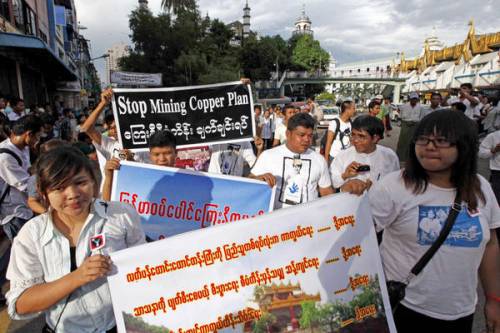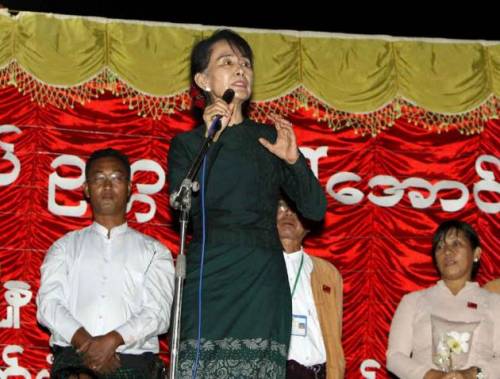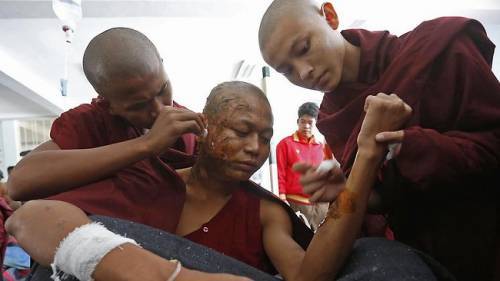The country of Burma, or better known as Myanmar, is in the midst of the often volatile transition to democracy. Like many countries before it, Burma is experiencing the growing pains of democratic rule. Governed under the brutal military junta since 1962, the thaw out from authoritarian rule to democracy has been a rocky one with few strides made. As inherent as the troubles of consolidating a democracy may be, this does not excuse some of the recent clashes between Burmese authorities and the citizens. A few incidents in the past few weeks demonstrate that the coming months for Burma will almost certainly be tumultuous.
Recent demonstrations at the site of a copper mine in Burma’s Sagaing region led to authorities cracking down and arresting seven protesters, including Moe Thwe, the leader of the protest. Meanwhile dozens of protesters were injured. Police claimed the protest became violent, a story which protesters deny. Police reportedly used tear gas, smoke bombs, and incendiary devices that reportedly burned several people. Farmers claim the deal was forced upon them by Than Shwe’s Military Junta nearly two years ago and has ultimately led to the eviction of farmers from their land in favor of the China-backed project. The majority of profits from the copper mine would benefit the military in Burma, which still has significant power in the country.
To top this off, a known political activist and former monk, U Gambira, who helped organize the 2007 anti-government protests, was detained by the government prior to the demonstrations. Many say this was an attempt by the ruling elite to prevent U Gambira’s support of the now nationwide protest against the copper mine. Family members have attempted to visit him in Insein Prison, the location where officials claimed he would be. To their surprise, the prison officials denied he was being held there. His whereabouts are currently unknown.
This back peddling of human rights comes only days after President Obama visited the country to congratulate President Thein Sein on his political reforms and progress towards a transition to democratic rule. The significance of President Obama’s visit should not be underestimated – the trip made him the first American President to ever visit the country.
The praise from President Obama comes after the release of political prisoners, the liberalization of the media, and the successful conducting of elections that have been a part of President Thein Sein’s political reforms since taking office 18 months ago. Despite these positive first steps, many in the country claim it is merely a crack in a large wall preventing civilian rule in the country – the metaphoric wall being the military.
The military’s grip on power is being challenged by Aung San Suu Kyi, a former political prisoner, who was among those released in the wave of reforms. Aung San Suu Kyi, who was placed under house arrest for 15 years and became a symbol of Burma’s democracy movement, winning a seat in the Pyithu Hluttaw, the lower house of the Burmese parliament in 2012. Her party, the National League for Democracy, won 43 out of the 45 seats up for grab in the election. Her call for action against the oppressive military junta throughout the 80’s and 90’s has won her considerable praise from the international community, receiving awards and invitations from countries around the world.
Building Democracy in a Reforming Myanmar
With all this said, can Burma truly become democratic? Small skirmishes such as the copper mine protests are not as uncommon as you may think. They happen in what are considered fully consolidated democracies. Take the U.S. for example. Protesters at Occupy Wall Street were pepper sprayed indiscriminately by police without warrant of force. Bills have been proposed by sitting Senators to ban protesters from public areas such as Federal building sites. The NDAA (National Defense Authorization Act) signed by President Obama allows for the abduction and closed military trial of any U.S. citizen anywhere under the broadly defined ‘suspicion of terrorism or terrorist related activities’. Meanwhile, Freedom House rates America as one of the best functioning democracies in the world.
Can Burma become a democracy? It can. With the right circumstances, Burma can push through the door that was unlocked when the Military Junta ceded power in 2011. If those that are in power are willing to let the people decide the fate of their nation, then and only then, will true democracy be brought to Burma.



Leave a Reply